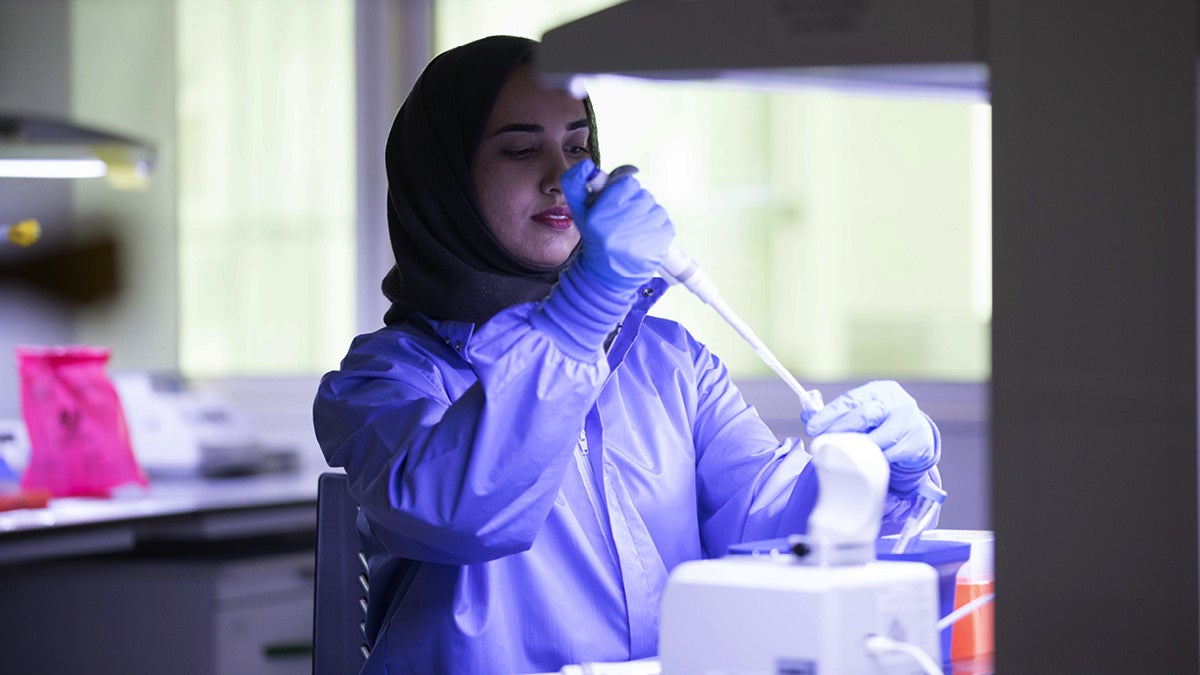
The race for a coronavirus vaccine has focused global scientific attention and its successes have been garlanded with gratitude and praise.
The triumphs – at least four vaccinations with regulatory approval – have been accelerated by genomic sequencing that has decoded coronavirus and provided key intelligence on its impact and growth rate through communities.
Susceptibility and severity vary between ethnic groups and researchers need rich and diverse genetic data to generate responses to the virus and its variants.
The immediate challenge is to eradicate COVID-19, but wide-reaching genomic data will also be the driving force propelling precision medicine and its ability to tailor treatment to a person’s genetic makeup.
However, studies have identified that genetic research is far from comprehensive and often accented towards people of European descent. A report by Public Health England underscored the urgent need to fully understand genomic implications, stating: “Many analyses have shown that older age, ethnicity, male sex and geographical area, for example, are associated with the risk of getting the infection, experiencing more severe symptoms and higher rates of death.”
Generating data that covers different ethnic groups is essential for a complete approach to confronting the virus and enabling precision medicine.
“If you are researching a disease or looking for disease treatments, the Arab genome is massively under-represented,” says David Brown, science and programme director of the Qatar Precision Medicine Institute (QPMI), a member of Qatar Foundation Research, Development and Innovation, which is close to sequencing 20,000 whole genomes to create a valuable bank of genomic intelligence.
“With COVID-19, it was noticed that different ethnic groups were being affected disproportionately and, after analysis, there were very strong signals for certain genetic variants that are known to be more prevalent in certain ethnic groups.”
Tackling coronavirus is a global mission and Professor Sir Mark Caulfield, chief scientist for Genomics England who was charged with delivery of the 100,000 Genomes Project, emphasises the importance of understanding how COVID-19 behaves across all genetic and societal environments.
“If we leave reservoirs in place, the virus will continue to mutate, and it will continue to evolve,” he says. “And as we know from previous pandemics, sometimes that leads to a worse situation. We desperately need to get the vaccination strategy right globally to defeat COVID.
“There is evidence ethnic groups of people have different reactions to it and we need to understand everything related to that because this is a global mission. It cannot be just country specific.”
If you are researching a disease or looking for disease treatments, the Arab genome is massively under-represented
Data has already given scientists vital information about the genetic codes that make some people more susceptible to the virus. A programme is underway to pinpoint the factors involved by studying 20,000 severely ill people and 15,000 control samples in the UK.
“It is an ambitious goal, but we want to answer the questions what is within the virus and what is within the human that makes a difference, and what will make the difference when we put those two together?” says Sir Mark.
“It’s very clear there’s a disproportionate impact, particularly on south-Indian Asian communities but also, to some extent, on people of African and Caribbean ancestry, so we have an absolute duty to make sure they’re included in sufficient numbers.”
He adds that ethnically diverse data gathered from around the world, including the well- organised Qatar Genome Programme (QGP), is vital to overcoming the pandemic and building a safer world.
The QGP was launched by the Qatar Foundation with the aim of integrating genomics into healthcare and creating a landscape where precision medicine can prosper. The initiative synchronises with a wider healthcare technology programme that is attracting academia, research communities, and technological and pharmaceutical enterprise to the country.
The progress aligns with Qatar’s National Vision 2030 to establish a regional hub for advanced healthcare through research and collaboration.
“Qatar has invested strongly in research and is funding more than 100 projects relating to precision medicine and it has established the QPMI to force the pace of discoveries and bring them into clinical practice,” adds Brown, former head of informatics infrastructure at Genomics England.
“It is also making sure that specific Arab genomic traits are made accessible to groups developing new treatments around the world.”
He believes initiatives in Qatar can be a catalyst for the greater understanding and application of genomic data to tackle a range of diseases, such as cancer and cardiovascular conditions, as well as ensuring viruses can be tackled effectively for all populations.
Collaboration is a key factor and Sir Mark adds that research work in east London’s culturally and ethnically diverse population has huge global implications because it will pick up similarities and differences between ethnic communities, which can steer vaccine and precision medicine research. The potential was highlighted in a partnership between QGP and Genomics England which discovered that 211,000 of 366,000 Qatari genome variants were present in the English genomics database.
Sir Mark, who oversees a coalition of 2,500 researchers in the Genomics England Clinical Interpretation Partnership, believes that novel techniques, such as how RNA was used to develop coronavirus vaccines, could provide treatment templates against a range of diseases.
“I think it will open up new vistas on accelerated production of vaccines and, potentially, new areas such as rare diseases and, possibly, cancer. I think these alternative therapies will create new opportunities to fight diseases,” he says.
As the world starts to emerge from the stranglehold of the virus, it is paramount to learn the lessons to insulate against future threats and to recalibrate systems to deliver better and more equitable care that encompasses all socio-economic and ethnic groups.
Investments in genetic data research, as demonstrated by the QGP, will pay dividends around the world.
Genomic research and development

Qatar Foundation (QF) is a nonprofit organisation made up of more than fifty entities working in education, research and community development. Dr Richard O’Kennedy, VP, QF Research, Development and Innovation, speaks about QF’s role in genomics research and precision medicine
What is Qatar Foundation’s vision when it comes to healthcare?
QF is a catalyst of innovation in Qatar and part of its long-term health initiatives is to map the genomes of the Qatari population. This required the establishment of the Qatar Biobank (QBB) and Qatar Genome Programme (QGP). More than 20,000 participants have already been recruited for the study and, although the aim is to reach 100,000 of our 2.8 million population, the data and intelligence generated so far has proved vital for both tackling coronavirus and developing better treatments and healthcare delivery. Both QBB and QGP are working together with other national stakeholders, to maximise the development and rollout of precision medicine.
How has the nation coped with the pandemic?
We were faced with countless challenges brought about by COVID-19, but we were able to mobilise our resources quickly & effectively. As a result Qatar has one of the lowest death rates in the world. Research, development and innovation (RDI), and many QF entities, supported the Ministry of Public Health and the hospitals in their work.
QF RDI facilitated different research collaborations with local and international entities to better understand the impact of the COVID-19 outbreak and the outcomes have been very promising. This includes providing very impactful insights into the roles certain genes play in infection. We also collaborated with other nations around the world which proved valuable to the global approach to counteracting the pandemic. By working together both locally and globally far better outcomes have been achieved.
How has Qatar’s genome research helped tackle COVID-19?
Sequencing enabled us to identify a number of genes that are associated with greater or less severe COVID-19 infections. Sequencing of the viral genomes also allowed detection of viral variants. An aspect to note is that there is sparse information available on Arab genomes even though there are more than 300 million Arabs worldwide. They have been poorly represented in the past, but our research is aimed at redressing that imbalance.
How is QF reshaping healthcare in Qatar and influencing global progress?
We aim to translate the outcomes of our research into improved patient welfare. Our genomic research entities are now focused on clinical implementation of research findings as soon as possible to enhance patient welfare. The value of knowing a person’s genome is vital as it means therapies can be much more tailored to the individual’s needs as clinicians can determine what is the best drug to use for treatment, the dosage needed, and when it should be given. We have a strong, continuing collaboration with Genomics England and all these efforts are working towards our goal to be at the forefront of precision medicine development.
What conditions could this pioneering approach help?
Precision medicine is proving to be incredibly valuable and economically effective. There are many studies underway or planned in areas including cancer, childhood diseases, pharmacogenomics, autism and diabetes. We are also looking at the importance of the environment and the role of education in providing a much-improved approach to healthcare and the public’s understanding of precision medicine.
Eventually, from an individual’s genome, we aim to develop health reports on what conditions they are more susceptible to and how they can adjust certain factors, such as their lifestyle, to stay healthy. There can be multiple genes and factors involved so being able to provide early warning of potential problems is a major asset.
How much has Qatar invested?
Public health has a strong national commitment with substantial resources allocated. At QF, investment in infrastructure, personnel and education has being going on for more than 25 years. QF’s Sidra Medicine, the major hospital addressing women’s and children’s health, is globally recognised and has a huge focus on genomics. QF has created an attractive environment for investment and innovation with major pharmaceutical and technology enterprises, joining the already existing extensive academic ecosystem.
In addition, Hamad Medical Corporation, the nation’s main provider of healthcare, has over 30,000 healthcare-affiliated professionals and specialised hospitals and clinical centres. This focus on precision medicine will be of major benefit to Qatar by providing more research capacity, improved healthcare provision, training opportunities and enhanced job creation.
For more information please visit qf.org.qa/research/precision-medicine
Promoted by QF

The race for a coronavirus vaccine has focused global scientific attention and its successes have been garlanded with gratitude and praise.
The triumphs – at least four vaccinations with regulatory approval – have been accelerated by genomic sequencing that has decoded coronavirus and provided key intelligence on its impact and growth rate through communities.
Susceptibility and severity vary between ethnic groups and researchers need rich and diverse genetic data to generate responses to the virus and its variants.

